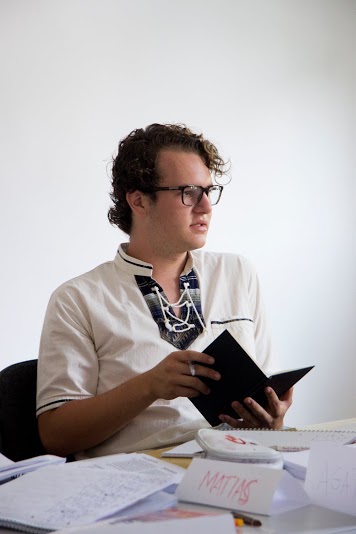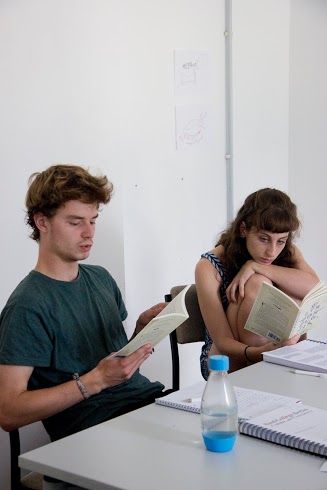
It has been three years since Bard College Berlin first adopted the Language and Thinking Program as a mandatory, three-week orientation in which admitted students are meant to practice both academic and creative writing. The program was initially introduced in 1981 by Bard College in Annandale-on-Hudson, New York with the aim of encouraging students to practice certain methods of thinking and writing so as to prepare them for a smoother transition into university.
The program’s activities start in the morning, last until the late afternoon hours, and stretch over five days each week. They are practiced in small seminar groups and include a variety of readings, creative exercises, thought-provoking games, and visits to Berlin, but are mostly focused on writing. At the beginning of a class, the students are given a few minutes for free, private writing, so that they write on anything that’s on their minds without any particular requirements or guidance. Apart from these tasks that are mostly helpful for “getting into the L&T mode” (and also into the “English mode” for the non-native English speakers among us), students are constantly asked to share their thoughts, discuss readings, and react to their peers almost only in writing. To new students, the emphasis on writing rather than on oral discussions or creative exercises might seem somewhat confusing, even exaggerated. James Harker, the coordinator of Bard College Berlin’s Language and Thinking Program, explains the logic behind the writing-intensive format:
Writing is the number one source of worry for new college students. The first goal of the L&T Program is to introduce and instill productive habits of exploration, inquiry, and writing. Some of those habits might seem counter-intuitive. For example, most students might naturally try to write a paper in a crunch session at the last minute. But L&T emphasizes writing regularly in very short bursts, as little as just a few minutes. Often students want to work slowly and perfect each word or sentence before moving on. But L&T often asks for quickly sketched, unedited writing as a first draft. Many students would rather only let others see their finished work, but L&T demands that everyone share their roughest versions. Most people write in isolation, but L&T makes it a group experience. The methods and exercises of L&T are intended to give students strategies for coming up with observations and ideas about texts and to make writing fun, social, and habitual.
Two weeks after the L&T Program ended and students have started their courses, some find the program helpful in terms of improving their academic skills. For others, it was a new way of looking at writing and sharing their thoughts within an educational setting. “I have done quite a lot of writing before, but I really like the idea that for the first time my writing was worthy because of my ideas and not because of the preconceived structure that I had to follow”, says Clara Canales, a 1st year student in the Economics, Politics, and Social Thought BA program. Some students (including myself) feel the influence of the program in how the readings they have done in those three weeks keep informing their current academics in different, both direct and indirect ways. One of my favorite readings in L&T was Nietzsche’s On Truth and Lying in a Extra Moral Sense. The topics that arose around the text’s discussion in the L&T keep appearing in some courses I’m taking, such as the Experimental Documentary class. The concept of Truth as I interpreted it in Nietzsche’s text during the L&T Program has informed my understanding of and reflection on the concept of Truth in documentary cinema.
Many of the topics that we introduce in L&T are intended to stay with you for the whole BA program says James Harker. In fact, even some readings will resurface in the four year core sequence. I always find connections between our writing and thinking in L&T and courses that I teach in the Fall and Spring Semesters. In my classes I certainly make use of L&T techniques. Though, without a doubt, regular semester courses have a different set of goals and priorities as well.
 Besides the readings done in class, students were required to read Sophocles’ Antigone and Franz Kafka’s Metamorphosis prior to their college arrival. I asked James some questions regarding the choice of the L&T readings:
Besides the readings done in class, students were required to read Sophocles’ Antigone and Franz Kafka’s Metamorphosis prior to their college arrival. I asked James some questions regarding the choice of the L&T readings:
Q: The works of Kafka and Sophocles served as a good stimulus for a discussion about the L&T guiding question “What does it mean to be a human?”, and yet there are other works that could also be appropriate for the discussion. What are the particular advantages of these works over possible others?
A: I agree! “The Metamorphosis” and “Antigone” bring up great issues about the physical body and the mind, private life and public life, as well as our recurring issues of “freedom and constraint.” They also make clear connections to the first semester of study at BCB. Antigone fits well with the first core course on Greek Civilization, Plato’s Republic and its Interlocutors. Kafka, meanwhile, is a German-language author, which pays homage to BCB’s location in the German Sprachraum. But many other texts would work as well, and the core texts of L&T will change every few years so that we can try out some new ideas and perspectives.
Q: How (and by whom) are the other readings in the L&T program chosen, and according to what do they differ every year?
A: When we began offering the Language and Thinking Program here in Berlin in 2013, our model was Bard’s existing program in Annandale and the wonderful selection of readings that their faculty and staff assembled. BCB faculty made additional suggestions, and we ended up with a collection of readings that reflected both Annandale and Berlin faculty contributions. For 2014 and 2015 we made more changes, which means that the Bard and BCB programs have been gradually diverging, looking now more like cousins than identical twins. For 2016 we’re planning a new theme and major overhaul of all the readings for L&T. The L&T teaching faculty as well as our whole BCB faculty are involved in the process.
When we consider new readings, we think about how they communicate with other texts and the overall theme and how they contribute to the diversity of writing in the program. Probably most important, though, is that we incorporate texts that the faculty really want to work with and think that students will find challenging, provoking, even inspiring.
While for some students the texts were inspiring and stimulating, others felt that the discussion around the texts was not completely satisfying, which might be due to the large amount of activities or the intensive nature of the program.
According to Clara, “in L&T as a whole, a lot of times the texts are interesting and you go through them, discuss them for half an hour and then you’re done. I think it would be cool if there would be more focus on answering one question… I don’t feel like we really concluded anywhere and it makes you feel like you didn’t really spend enough time on the reading. An exercise that I found particularly interesting was that we had to translate Antigone’s Ode to Man from original Greek into English with glossary words that we were provided with and everyone came up with a completely different translation. This makes you understand how difficult it is to translate an original (Greek) text into English without losing certain nuances”.
Besides the program’s academic and creative advantages, the L&T is also a time in which new students get accquainted with each other and with the faculty members. The evenings and weekends are often spent together by students in the city center or on-campus, on trips to close-by forests, museums, or in the common rooms of the dorms. The personal and at times intimate nature of the writings done in class also helps the students to get to know people in a better (and faster) way. By the time the program had ended, I felt as if Berlin was not so strange and foreign anymore. I made friends with whom I do not necessarily share a class, and whom I would have probably not gotten to know as easily. Many of the students, including myself, have taken a gap year prior to our arrival to the college. The thought of going back to an educational setting after a long break seemed to me somewhat horrifying, since the transition to college life, especially if it is in a foreign country (as it is for most of our student body), is never simple. The three weeks of Language and Thinking certainly made it easier for many of us to smoothly adapt to the new setting and familiarize ourselves with the great city in which we live.
[hupso_hide]
